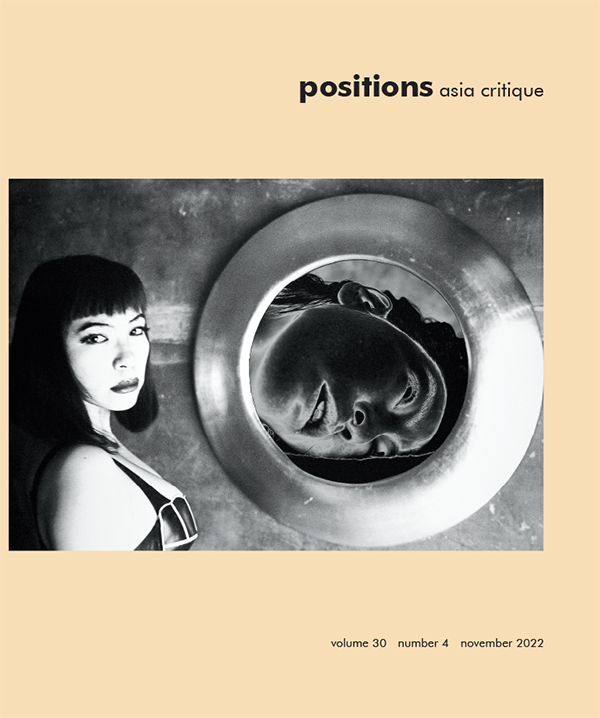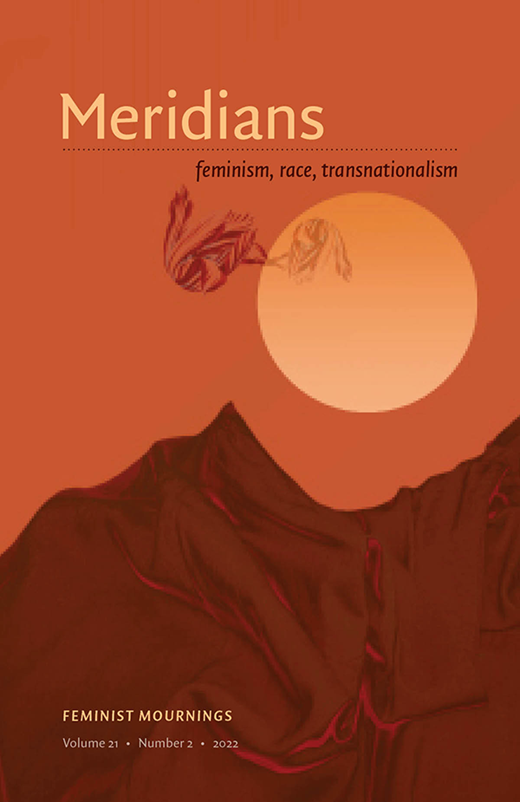Our third Poem of the Week this April is “anseo / here” by Emer Lyons from Four Poems from a Lesbian Diasporic Body, published in Feminist Mournings, a recent special issue of the journal Meridians.
a hoan / one
the cheapest preschool around was downstairs in the town hall
+ taught entirely in Irish
alongside a flimsy grasp of my native tongue, i learnt many
valuable skills
i learnt the skill of bartering
trading jam sandwiches for rice cakes coated in nutella
i learnt the skill of self-preservation
thumping a boy to tears in the bathroom after he stole my
miniature packet of smarties
i had bartered away a wagon wheel for those smarties
so i wasn’t about to be left folamh láimh
i learnt the skill of molding
somebody’s mother came w/pristine marla, a cheap version of
play-doh
we sat in a circle around her as she smoothed the strips of
marla into heads + bodies
she made a family, a mum, a dad + two children
she put this family into a boat that she had carved like a viking
foirfe she said
+ the boy started to cry again
+ then i started to cry
the family in the little boat didn’t look like our families
a dó / two
i grew up w/many marie’s
plagued, they were, by the weight of such a name
one marie in particular couldn’t keep her head above the sea of
bitterness,
of sorrow, of rebellion
she’d sink into rages, when we were only five, six at most
marie’s darkness would scream a siren of warning
the teacher would evacuate us, children + children first
marie would shred the classroom to ribbons
the teacher stayed in there w/her, asking her again + again to
count slowly to ten
we’d peek one at time through the square of glass in the door
lined like graph paper, dividing marie + the teacher into pieces
small enough to hold
the teacher held marie’s exhausted body as we crept back in
quietly righting the toppled chairs + desks
a trí / three
one day the virgin mary’s head cracked off her shoulders +
dropped to the floor
we crowded around her
she didn’t look half as pious w/out her hands clasped against
her chest in prayer
her head looked ordinary lying on the lino by itself
we’d been left alone for more than ten minutes
we filled the precious moments of freedom by pushing +
shoving each other
w/all the pent-up purposelessness of youth
the girl who’d slapped against the cupboard that dislodged
mary’s head
frantically called out for glue
it was primary school there was no sufficient glue
only the stuff we’d lather on our hands + peel off like skin
the girl put as much as she could on the statue w/out it being
noticeable
that afternoon we turned to mary as we did every afternoon to
pray
her head oozed off before we’d a chance to hail
a ceathair / four
right girls, ye are old enough now to start getting involved
w/the nastier side of the bible.
the days of loaves + fishes + tax collectors stuck up trees were
behind us
our teacher at the time was a wizened old nun, smaller than
some of us at ten
she glorified in her task as our tour guide into sin, damnation +
HELL
the girl i’d married at small break under a tree refused to look
at me
i got the sense that our first kiss was to be our last as she rolled
the daisy ring from her finger
my eyes darkened at the sounds of the fiery inferno escaping
the nun’s pinched lips
i was sure to be damned if i continued to love other girls + not
god
i wondered if his hands would be as small + soft
if he’d smell faintly like the morning’s milk spilt on a wool
jumper
if i’d find heart-shaped notes from him in my school bag
the small nun reprimanded me for staring into space, told me to
read the next line aloud—
thou fool, shall be in danger of hell fire
a cúig / five
elbows out emer, elbows out
the nun built like a tank
whispered to me as i approached the starting line
she had overheard me call someone gay the week before
+ called me up to her desk to ask me if i knew what the word
meant
i said no then yes
she said, we’ll talk about this later
i was still waiting for this later to come as i lined up for the
sprinting race
she winked at me + smiled from the side lines
after i lost the race another teacher said i could’ve won if i
wasn’t so busy looking around me
ah, the big nun said, she’s better off w/a bit of curiosity
a sé / six
ciúineas cailíní
we press our fingers to our lips
in the pose of silence we’ve been taught
our bodies tell our minds to be quiet
Feminist Mournings, edited by Kimberly Juanita Brown and Jyoti Puri
Contributors to this special issue of Meridians explore feminist articulations of mourning that are anchored in slavery, settler occupation, colonialism, migration, and the violence of modern national states. The authors perceive mourning not as a process of individualized grief to be worked through or overcome but as a collective condition that encompasses historical consciousness and contemporary collective action.
Meridians: feminism, race, transnationalism
Ginetta E. B. Candelario, editor
Meridians, an interdisciplinary feminist journal, provides a forum for the finest scholarship and creative work by and about women of color in U.S. and international contexts. The journal engages the complexity of debates around feminism, race, and transnationalism in a dialogue across ethnic, national, and disciplinary boundaries. Meridians publishes work that makes scholarship, poetry, fiction, and memoir by and about women of color central to history, economics, politics, geography, class, sexuality, and culture. The journal provokes the critical interrogation of the terms used to shape activist agendas, theoretical paradigms, and political coalitions.


